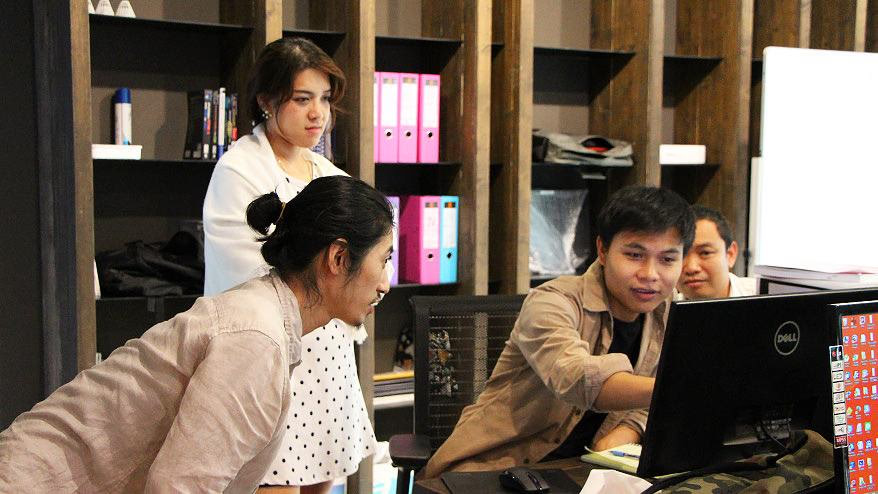Hello. This is Kawamura from Monosus Thailand.
Thailand is currently in the middle of the rainy season. (The rainy season in Thailand runs from June to October every year, with rain showers almost every day.) By the time this article is published, the rainy season will likely be over and we will be in the more comfortable dry season.
Well, this time I, Kawamura, would like to introduce some points to be careful of when working in Thailand, based on what I learned from working with Thai people in Thailand for four years.
1. Don't be afraid if you can't speak. The other person is a master of communication.
When you start working in Thailand, one thing that you will probably encounter is the language barrier.
In my case, I attended a Thai language school for three months before starting work in Thailand and thought I had learned all the basic conversation skills, but when it came to directly communicating things at a work-related level, I still found myself completely confused.
Fortunately, Monosus Thailand has two highly skilled interpreters on staff, so there are no problems with our work, but one thing that can easily go wrong is relying too heavily on the interpreters when conversing with Thai people.
In business, there are many situations where accuracy is important when communicating things.
However, there may be cases where it is a little difficult to understand, and even if you have to use gestures and body language, it's OK as long as the message gets across.
At first, you'll probably get a "???" response when you ask them a question. Then, try to explain using body language or as much Thai and English as you know.
At first, you may be afraid that you won't be able to communicate well, but there's no need to worry. Thai people generally enjoy conversation. Even if you can't speak well, they will listen and try to understand you.
Communication is essential when working with people, but here in Thailand, when working with local Thai people, each small communication is extremely important for both Japanese and Thai people as it provides an opportunity for them to share and learn from each other about differences in working styles, cultures, and values.

A Japanese director explaining the project specifications
2. The Sabai spirit that is deeply rooted in Thailand
There is a word that is often used in Thailand called "Sabai." It is one of my favorite words. It means "comfortable, comfortable, easy," and I think it is an appropriate word to describe Thai people.
You may be thinking, “Oh, so Thai people are optimistic,” but that’s not what I want to convey.
What I feel is that Thai people are good at "living happily and comfortably together, no matter what the circumstances."
At the same time, I feel that they value human connections very much. It's not like they're trying hard or consciously doing it, but rather it seems like they've naturally acquired the habit of being supportive and helping each other.
The custom of not treating even other people's problems as if they were someone else's is scattered throughout everyday life.
That's the national character of Thai people. I love it.
3. Thai politics: the current situation
Since the military coup that broke out in May 2014, Thailand has been ruled by the military.
By the way, the 2014 coup was the 16th coup overall, so many people may already be familiar with it.
In August 2016, a national referendum was held to pass a new draft constitution prepared by a drafting committee appointed by the military government.
General elections are scheduled to be held at the end of 2017, but the draft bill stipulates that six seats in the Senate (250 seats) will be given to the commander-in-chief of the military for five years after the general election, and the remaining Senate seats will be selected by the military government, raising concerns that the military's influence will continue to be strong.
Although the country is now under military rule, it is not as if life is inconvenienced or that there is a daily state of tension, but as a Japanese person living in Thailand, I am also worried about where the future holds.
4. Be careful when talking about the royal family!
As this article was being written, King Rama IX passed away on October 13th.
Thailand is now in a state of great sadness, as King Rama IX was said to be the most beloved king in the country's history.
Due to issues such as royal succession, the future direction of Thailand is a concern for many Thai citizens and foreigners living in Thailand, but care must be taken when speaking about these issues in public.
Lese majeste is still a crime in Thailand.
What this means is that if you are found guilty of criticising the monarchy and are charged with a crime, you can be sentenced to up to 15 years in prison, regardless of whether you are Thai or foreign.
In one example, a man was sentenced to 30 years in prison in 2014 for allegedly defaming the monarchy on Facebook. There are also reports that there has been a significant increase in convictions for lese majeste offences since the May 2014 coup.
I don't think there will be many cases where this will cause any problems in your daily life, but it's a good idea to keep it in the back of your mind.

Portraits of the King are carefully displayed throughout Thai homes and shops.
5. Language and greetings
This is not limited to Thailand, but when working together, "how to communicate" is very important. In Thai, polite language is basically made by adding Krab (Krap) to the end of a sentence if it is a man, and Ka (Ka) if it is a woman. Of course, you can still get your point across even if you omit it, but it's good to get into the habit of speaking politely.
Furthermore, unlike Japanese, Thai has five tones in its words.
- "Pingsheng" (-): Pronounced flatly at a normal voice pitch
- "Low voice" (\) - pronounce in a low, flat voice without any intonation
- "Down voice" (∧) - Pronounced in a tone that descends from a high pitch
- "High voice" (/) - pronounce in a high voice until the end
- "Upper voice" (∨) - rising from a low note and ending with a high note
Differences in tones are not very familiar to Japanese people, but in Thai, different tones can result in completely different words and meanings, so it is important to be careful.
In Thailand, it is customary for younger people to make the wai (the Thai gesture of joining hands) when speaking with older people.
Here too, Thai people tend to be lenient towards Japanese people, but if you greet customers and older people with wai, you will be able to make a greater impact on Thai people's hearts.

Familiar characters are also popular in Thailand.
Above, I have written about things to be careful of when living in Thailand.
We will be bringing you more information about Thailand soon. See you next time!

